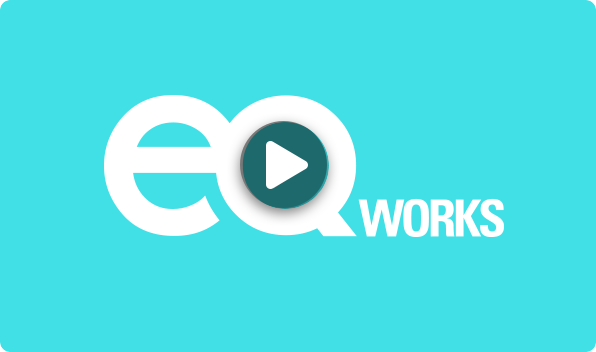Emotional Intelligence
What is emotional Intelligence? It’s the ability to discern between, manage and express our emotions appropriately
Why is Emotional Intelligence (EI/ EQ) important?
Emotions communicate experiences, illuminate our awareness and help us interpret our world. Emotions enable us to recognise or make changes. That’s why tapping into emotional experiences can help us strive to the best of our abilities and keep us open to opportunities. Developing Emotional Intelligence moves us towards success and fulfilment, yet few people prioritise their EQ – Emotional Quotient. That’s a mistake.
Difference between EQ & IQ?
Your intelligence quotient (IQ), on the other hand, does none of these things. IQ tests purport to measure intellectual and reasoning abilities, which are quite different things. Although incredibly valuable, IQ on its own tells us nothing about our sensory information.
IQ isn’t usually correlated to success or wellbeing. For the best results, our intellectual and emotional functions need to work together. That’s why IQ is gradually being replaced by EQ testing as the best way to identify and build winning skills.
What is Emotion?
Our definition: “We experience and perceive the world through our emotions. Our senses collect raw sensory data, but emotions help make sense of it. Emotions have an expressive and behavioural element that helps us discern, manage, and communicate the meaning of things. Understanding, mastering, and applying emotions appropriately can encourage success and foster wellbeing.”
5 Purposes of Emotion

Survival
Emotions help us calibrate our experiences, encouraging us to move towards our needs and away from threats

Decision-making
Emotions working with cognition, provide the meaning & reasoning behind decision-making

Motivation & appreciation

Communication & connection
Emotions enable us to understand and value others to build effective relationships

Learning & beliefs
Emotions facilitate automated thinking & behaviours, which saves time & energy but diminishes presence
Emotional Intelligence Testing
Understanding and measuring your EQ unleashes your potential and that of your team
- Engage teams and leaders
- Pinpoint skills that matter for each role
- Identify and develop high performers
Are emotions good for us?
Being open to emotions
Emotions are more important than most people realise. Being open to our emotions allows us to monitor them for the precious information that each emotion has for us. Therefore, emotions help us to understand what’s going on around us, to discern what’s appropriate and useful.
Connecting mind and body
Working with our emotions means working with our mind and body. We now know they work together, though historically they were treated as wholly separate. Psychologists and psychiatrists focussed on the mind, whilst doctors and surgeons focussed on the body, operating as if they were not connected.
Increasingly, we now realise that holistic approaches that integrate the mind and body are essential to support and develop people more effectively.
TIP: To sync your mind and body, notice your breathing. Pay attention to its depth, speed, movement, placement, and its effect on your sensations. In particular, notice your out-breath, as this is what connects and calms us, switching on our relaxation response. Notice your voice when you speak and your movements, and then notice what happens to them when you start noticing! This awareness helps us connect to our bodies. It slows us down and facilitates thinking, allowing us to express ourselves more clearly and take more considered, effective actions.
Testing EQ
If you want to develop the right skills, recruit the best people, and perform at a higher level, EQ testing can give you valuable information. These tests can reveal how you use emotions and where you could benefit from development and training. Remember – personality and/or IQ tests do not correlate to these development needs – only EQ tests do.
Is EQ as important as IQ?
EQ V’s IQ
For more than 100 years, IQ was the accepted measure of intelligence, relating to things like verbal reasoning, mathematical ability, and memory. Although it is an incredibly important set of skills, IQ does not relate to our overall understanding of ourselves and our actions. It tells us very little about context, relationships, or the “bigger picture,” because we need to know the value of something before we can measure and manage it. Value, of course, is determined by our emotions – it is all linked.
So while IQ can give you a measurement of some aspects of intellect, true intelligence is actually the balance of thought and emotion, facilitating our ability to adapt to change. Unsurprisingly, organisations are increasingly turning to EQ to test for the skills that matter to them and increase work performance. This follows the overwhelming body of research, which reflects the importance of Emotional Intelligence for high performance.
Are emotions bad for us?
Don’t shoot the messenger
It’s true, emotions can get us into trouble sometimes. However, that only occurs when we don’t acknowledge, understand, express, or manage them appropriately. For instance, children are encouraged to ignore, devalue, or suppress their emotions, and they aren’t given support to work through their uncomfortable or complex feelings.
Instead, people need to be encouraged to connect with and express their emotions appropriately – hiding from them is counter-productive and unhealthy.
EQ FAQ
Q: What are the components of emotional intelligence?
A: Depending on the EQ model used, EQ components vary slightly. The key EQ & Social EQ models are explained below.
Q: Can I really build my emotional intelligence?
A: Yes. Unlike IQ or personality traits, greater emotional awareness and management are possible through learning and practice. You’ll also understand your strengths, vulnerabilities and how to best develop or work with emotions.
Q: Are some people more naturally in touch with and adept at using emotions?
A; Yes, we believe so. Some people seem to be naturally more empathic for instance, whilst others find it difficult or impossible to feel much for anyone or anything. Imagine we’re all on a continuum (a normal distribution curve) with typical spread of high or low EQ skills becoming less prevalent at either ends of the scale. Most people have the ability to build their emotional intelligence, though some people however may find it harder to build certain components.
Q: What is EQ and how is it measured?
A: Great question. EI stands for Emotional Intelligence. Strictly speaking EQ stands for Emotional Quotient. EQ is a statistically created number that helps describe a person or group’s emotional intelligence. It’s based on lots of sample data which creates what’s called a normed population similar to how IQ scores are measured. Using what’s termed normally distributed populations (displayed graphically as a bell curve), we dramatically increase our knowledge and practical applications for these populations and scoring. For the EQ-i 2.0, 100 is the average score for all EQ attributes with a standard deviation of 15. This describes the spread of scores within a population. This norming enables us to reveal lots of useful things about the population, probabilities of having various EQ scores and enables us to statistically compare, analyse or make predictive statements regarding people’s EQ attributes and their scores. This gives us powerful, reliable and mathematically provable information and results.
For instance, around 67% of people will score between 85 and 115 for an EQ attribute and indeed for overall EQ. This is a spread of 1 standard deviation either side of the mean. And having an EQ (or IQ) score of over 130 (2 standard deviations from the norm) is found in just 2.2% of the population. Statistics is powerful at helping us understand, measure, compare, develop, recruit for and tailor programmes for our clients. In a nutshell, it helps us to help you, more. You can read a sample EQ profile here.
The terms EI and EQ are now used interchangeably although strictly speaking the former refers to the meaning, the latter its measure.
Q: I notice there are different EQ models and tests. How do I know which ones are right for me?
A: Great question. Fundamentally EQ assessments look at very similar things. We use two of the best and most comprehensive. If you work with a highly experienced EQ specialist this will be more important to you than what assessment you use. Speak to them and perhaps ask for references to understand how others have been helped.
Q: What are the models of EQ.
A: Broadly there are 3 models of EQ (summarised below). These EQ models view emotional intelligence from slightly different perspectives though have strong similarities.
The EQ Ability Model
The Mayer-Salovey model is described as the ability to perceive, understand, manage and use emotions to facilitate thinking. This is the foundation of the Ability based model. Mayer-Salovey published their seminal work on emotional intelligence in 1995 and are rightly seen as founding fathers to emotional intelligence work. Their model has four key areas;
- Perceive Emotions
- Use Emotions
- Understand Emotions
- Manage Emotions
The EQ Mixed Model
The Daniel Goleman model sees EQ as an assortment of emotional and social competencies that contribute to managerial performance and leadership. Daniel Goleman is very much responsible for bringing EQ into the modern vernacular in his best-selling 1996 book: “Emotional Intelligence: Why it can matter more than IQ.”
His 5 components of the EQ model are stated as;
- Self-awareness
- Self-regulation
- Motivation
- Empathy &
- Social skills
EQ Trait Model
This model was developed by Konstantinos V. Petrides. The most widely taken trait EQ assessment is the EQ-i 2.0 (originally created by Reuven BarOn as the EQ-i in 1995). BarOn describes Emotional Intelligence as;
“an array of interrelated emotional and social competencies, skills and behaviours that impact intelligent behaviour.”
The 5 key domains of the EQ-i 2.0 model are;
- Self-Perception
- Self-Expression
- Inter-Personal Relationships
- Decision-Making and
- Stress-Management
The EQ-i 2.0’s 5 categories (composites) each have 3 further detailed sub-composite areas. This is the EQ assessment that EQworks uses to uncover overall EQ abilities. For clarity, throughout this website where we state an EQ test, we usually refer to either the EQ-i 2.0 or the Social EQ assessment, The A.R.T.
What is Social EQ?
Social-Emotional Intelligence is the part of overall emotional intelligence that relates purely to how we relate to others and communicate. And the reason we, at EQworks, separate it out is that it’s so important and a key area of interest & development to most of our clients. Most EQ tests simply don’t have sufficient detail to measure or develop key aspects of social skills so the Advanced Relationship Skills Test is not only unique, but works beautifully in tandem with overall EQ assessments to reveal an unparalleled view of someone’s or a team’s EQ.
Why don’t most EQ consultancies or emotional intelligence practitioners use social EQ tests?
Most EQ trainers are not Emotional intelligence specialists, focussing exclusively on, and facilitating, EQ skills day in and day out. We are. Having this depth of expertise and using both EQ and social EQ assessments makes a big difference.
What’s a brief history of emotional intelligence?
Charles Darwin first identified the importance of emotional expression for survival. In 1940, the leading American psychologist David Wechsler described the influence of non-intellective factors on intelligent behaviour, arguing that we need to take these into account when talking of intelligence. Howard Gardner introduced the concept of Multiple Intelligences in 1983.
Dr Reuven Baron, the creator of the EQ-i ® EQ measuring tool, coined the acronym EQ (emotional quotient) around 30 years ago. At this time, several leading emotional intelligence specialists, particularly Professors John Mayer and Peter Salovey, were key to developing our current understanding of emotional intelligence. In 1995, Daniel Goleman published his comprehensive work ‘Emotional Intelligence – Why it can matter more than IQ’ which led to greater recognition of EQ and its potential for performance development.
What’s the future of Emotional Intelligence?
That depends very much on people, like you. If we all took a little time to become more emotionally aware & build emotional intelligence skills many things will change, for the better. The quality of leadership increases will improve. As EQ increases, we demand more of ourselves, our organisations and of our leaders in ways that serve us all. We see ourselves more as leaders, individually taking responsibility more and being more agile at making things happen.
Our world will become more efficient, healthier, more well-adjusted, with fewer conflicts, greater synergies and collaborations. Organisations then become more strategically clear and well run. They find the right people for their more clearly defined roles. People will be encouraged to do what they love & ultimately love what they do.
How do I know this? Because this is what our clients already experience and know.
Services We Offer
Motivational Speaker
Experience an insightful and motivational speaker who inspires, educates and entertains your people
Training
Develop business-focussed skills that focus on leadership, resilience and relationships
Executive Coaching
Immerse yourself in our unique approach to develop the awareness and resources to attain goals and new skills
